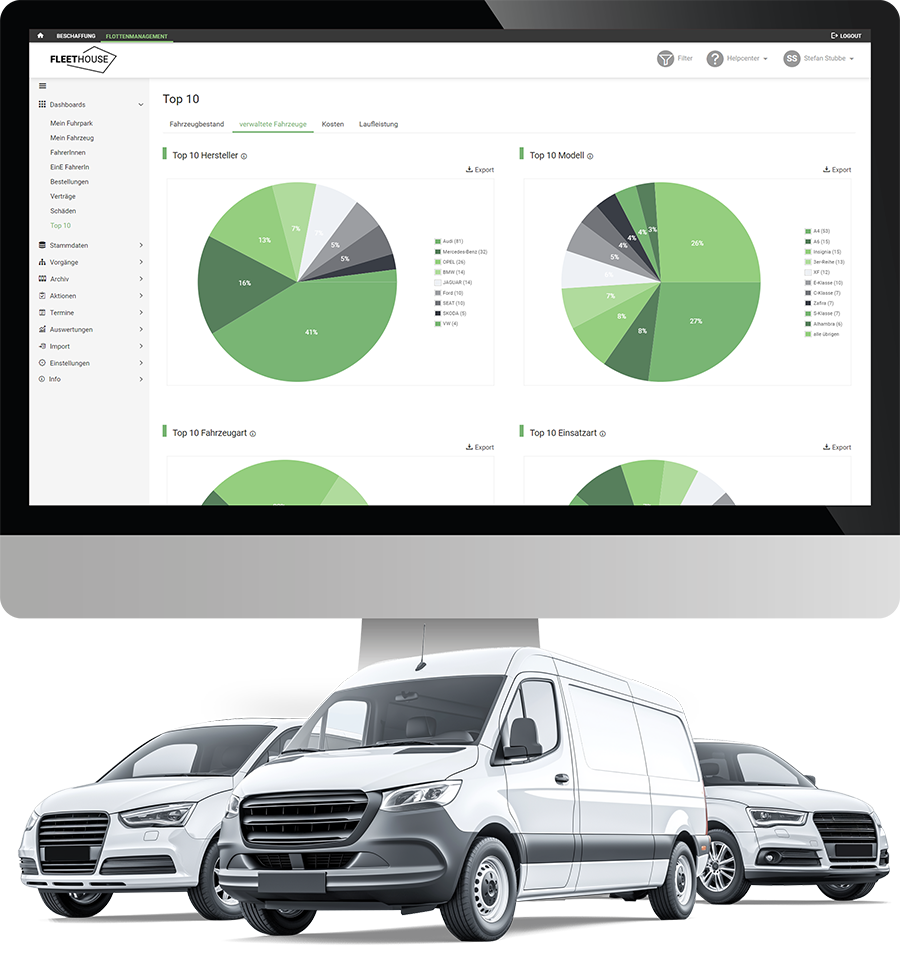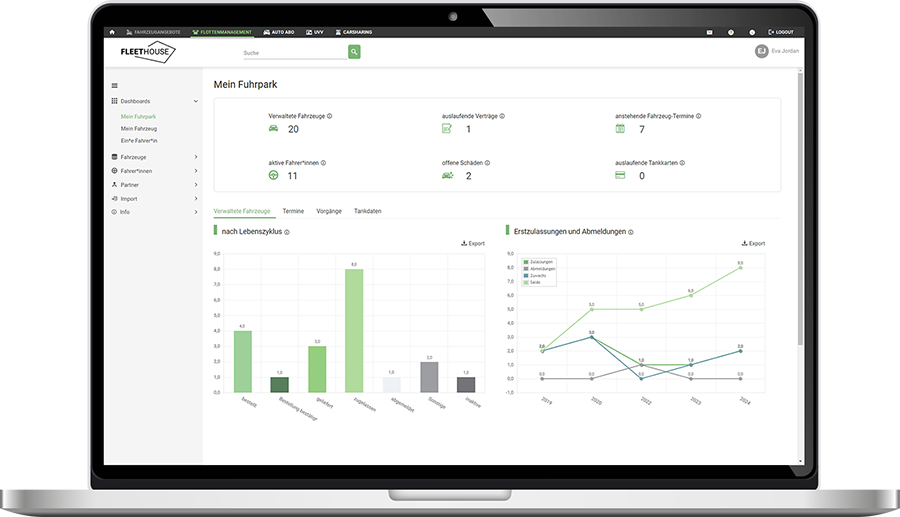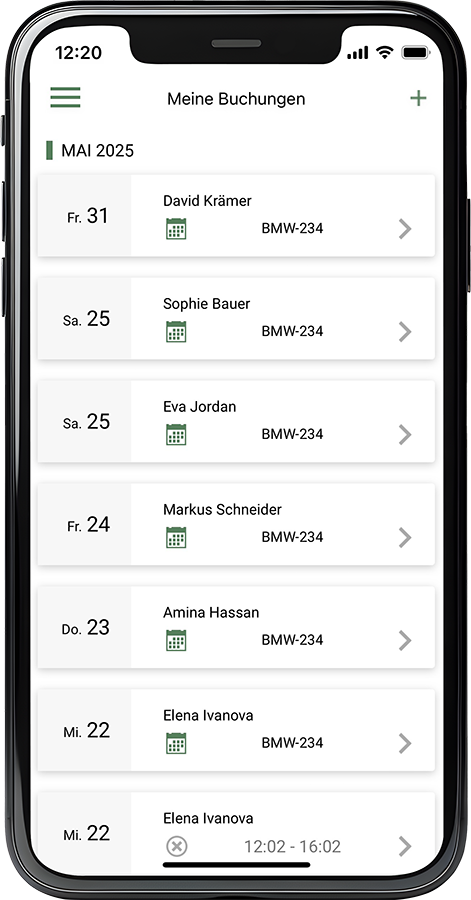A fleet manager has many tasks and plays an important role in the company by ensuring the mobility of employees.
This is not just about organizing the vehicle fleet, but also about complying with important regulations and overcoming a wide range of challenges. A successful fleet manager must therefore have numerous skills in order to meet the requirements of a modern company.
In this article, we will introduce you to what a fleet manager is and what tasks fleet managers have. We also provide tips on what requirements a fleet manager should have and what the salary prospects are like.
Contents
What is a fleet manager?
A fleet manager is responsible for the strategic planning, efficient organization and management of all vehicles in a company’s fleet. The fleet manager is thus responsible for a wide variety of vehicle types – from cars, trucks and commercial vehicles to special vehicles. He coordinates the mobility of the entire company and ensures smooth processes in the vehicle fleet.
In addition, the fleet manager plays a central role in ensuring compliance with legal regulations, such as continuous legal inspections, and is responsible for documenting and monitoring all relevant processes and data. These tasks are crucial to ensure both the safety of the vehicle fleet and the economic efficiency of the company.
What are the tasks of a fleet manager?
A fleet manager has extensive and varied tasks to ensure company mobility. The most important activities include
1. Procurement of vehicles
Determining requirements and procuring vehicles is one of the most important tasks of a fleet manager. In doing so, he should consider factors such as the requirements of the company and its employees, the budget, the availability of vehicles and the environmental impact.
In addition, it is necessary to analyze the long-term operating costs such as financing costs, depreciation, maintenance, fuel consumption and insurance premiums when making the selection. The choice of suitable vehicles not only has an impact on the company’s mobility, but also influences the sustainability and efficiency of the entire mobility fleet.
A well-structured area of responsibility in procurement also includes examining financing options such as leasing or purchasing and coordinating with suppliers to secure the best conditions. The fleet manager must be able to react flexibly to changes in the market, for example in the event of supply bottlenecks or price changes, while at the same time taking into account the needs of the employees.
2. Budget management and cost control
The fleet manager’s tasks also include managing and controlling the costs of the vehicles. This includes the expenses for the purchase and maintenance of the vehicles, but also the costs for consumption, insurance and taxes. Good cost control is essential in order not to exceed the budget and avoid financial bottlenecks.
It is also important that a fleet manager carries out regular cost analyses in order to uncover weak points and identify potential savings. One Fleet Management Software makes it much easier to monitor consumption, maintenance costs and other operating costs. Effective budget planning can help to avoid unnecessary expenditure in the vehicle fleet and ensure long-term profitability for the company.

Fleet management for just € 2.90 per vehicle per month
Fleethouse gives you clear dashboards and an all-round view of your fleet
3. Planning and organization of maintenance and repairs
Other fleet manager tasks include ensuring that the vehicles are always in perfect and roadworthy condition . This includes regular maintenance and repair work on the vehicles. This requires precise planning and organization, especially for commercial vehicles or functional vehicles, so that the vehicles are not down for an unnecessarily long time and work processes are not disrupted.
In order to optimize this process and all associated tasks and duties, a fleet manager should find out about upcoming dates well in advance and enter these dates in their maintenance schedule . If necessary, companies can also conclude a maintenance contract with a workshop to simplify regular maintenance and inspections.
In the case of classic company cars, a transfer of the duty of care through a usage transfer agreement must ensure that the users take care of the timely scheduling and performance of maintenance and report any necessary repairs to the fleet manager.
Another important point is repair planning: here, fleet managers should react quickly and flexibly in order to carry out unforeseen repairs quickly and easily.
4. Fleet optimization and modernization
Fleet manager tasks also include the continuous optimization and modernization of the fleet. This involves not only the purchase of new vehicles, but also the implementation of new technologies and systems to make the fleet more efficient and cost-effective.
It is necessary to carry out regular fleet analyses to determine which vehicles should be replaced or supplemented. A detailed data analysis can help to identify weak points in the existing fleet, be it in terms of capacity utilization, operating costs or environmental impact.
One way of optimizing fleets is to introduce telematics systems, for example, which enable better monitoring of vehicles and optimized route planning. The introduction of e-vehicles or hybrid models can also make sense in order to reduce fuel and maintenance costs and at the same time make a contribution to environmental protection.
5. Owner liability and safety in the vehicle fleet
One of the central tasks of a fleet manager is to comply with the legally prescribed owner liability obligations. In addition to regular driver’s license checks, this also includes proper instruction all drivers in the safe handling of vehicles and how to behave in the event of accidents. This should increase employee safety and minimize the risk of accidents. Since owner liability is enshrined in law, the implementation of driving license checks and driver training should not be taken lightly. Failure to do so could result in severe penalties in the event of a claim.
In addition, technical solutions such as reversing cameras, distance control or emergency brake assistants can also be useful for increasing safety in the fleet and reducing accident figures and costs at the same time. It is advisable for fleet managers to keep an eye on the latest developments in vehicle technology and invest in new safety technologies where necessary.

6. Claims management
If an accident should nevertheless occur, the fleet manager needs to deal with it quickly and professionally . Efficient and well-organized claims management is important in order to avoid unnecessary costs and keep employees mobile.
The fleet manager should also carry out an accident analysis to identify possible causes and trends and take appropriate measures to improve safety. Overall, safety and claims management is an important aspect of the fleet manager’s job that requires constant attention and monitoring.
7. Management of insurances
A fleet manager also bears responsibility when it comes to fleet insurance. It is important that all vehicles in the fleet are adequately insured and that the insurance conditions are met. A thorough review of the insurance conditions is essential to ensure that the fleet is adequately covered in the event of an accident or damage. This also includes checking the sums insured and liability limits.
In addition, there is always the question of the need for insurance. In many cases, pure cover via liability insurance can be more economical than fully comprehensive cover. However, in order to be able to decide this, all data relating to the accident and damage event must be documented accordingly. Here, the fleet manager absolutely needs suitable software as a tool.
8 Sustainability and environmental protection
A fleet manager not only bears great responsibility for the organization of the vehicles, but also for the environment and sustainability. More and more companies are implementing measures for sustainable fleet management in order to reduce environmentally harmful emissions and contribute to climate protection. When procuring vehicles, for example, fleet managers should ensure that the vehicles meet current environmental criteria. This includes the introduction of alternative drive types such as electric or hybrid vehicles. E-fuels are also playing an increasingly important role in vehicle fleets.
Corporate car sharing can also help to reduce harmful environmental impacts. Sharing pool vehicles increases the utilization of the vehicles and fewer are needed. This can also reduce fleet costs.
9. Fuel management
Expenditure on fuel accounts for a significant proportion of operating costs in the vehicle fleet. In some cases over 30% of the TCO. Fuel management therefore aims to reduce fuel consumption, cut costs and minimize the environmental impact at the same time.
One possibility is to train drivers to drive more efficiently in order to reduce fuel consumption. In addition, monitoring fuel consumption and implementing telematics systems helps to optimize consumption. Switching to environmentally friendly fuels is also an important factor in reducing environmental pollution.
Specifications such as not refueling on freeways and the right choice of fuel card provider also have a significant impact on subsequent costs.

Do you want to give Excel the boot?
Fleethouse reminds you of important dates in your fleet for just €2.90 per vehicle per month.
How does software support fleet managers in their tasks?
Fleet management software such as Fleethouse relieves fleet managers of the burden of completing their tasks. First of all, it enables the central storage and management of all vehicle and driver data, including technical specifications, fuel data, contracts and maintenance histories. This not only makes it easier to maintain the information, but also to access it.
Thanks to clear dashboards, all appointments in the fleet can be monitored and evaluations generated. Cost control is also significantly improved. All costs associated with the fleet, such as fuel, insurance and taxes, are recorded and can be broken down per vehicle.
Ideally, fleet software should have a modular structure so that fleet managers can select the appropriate functions according to their needs.
In addition, such software helps to simplify the management of complex processes. It reminds you of important deadlines such as tests or inspections, helps you comply with legal requirements and simplifies documentation. For companies, this means more security and less administrative work.
The software creates transparency, especially for large vehicle fleets, by preparing and structuring relevant data. This enables better planning and makes decisions more informed and comprehensible.

What requirements and qualifications does a fleet manager need?
A fleet manager has a wide range of activities, so a number of skills, specialist knowledge and practical experience are required. This enables them to do justice to the daily tasks in the fleet.
In addition to organizational skills and technical knowledge, the ability to plan strategically and react flexibly to unexpected challenges also plays a decisive role. A basic understanding of the legal framework and regulations is just as important as the ability to work with modern technologies in order to make fleet processes productive.
The most important prerequisites and skills that a fleet manager should have include
1. Professional qualifications
The position of fleet manager does not require any standardized training. A fleet manager has often completed training in vehicle technology, logistics or business administration.
A university degree in these areas is also a good prerequisite. To become a fleet manager in smaller fleets, commercial or technical training is often sufficient.
2. Practical experience in the vehicle fleet
A fleet manager has usually already gained practical experience with vehicles. They often start their career in positions as fleet coordinators, dispatchers or vehicle administrators. This means that prospective fleet managers can already gain experience with the operational processes in the fleet.
3. Technical understanding
Technological progress also has an impact on the vehicle fleet. In order to adapt to advances in the industry, a fleet manager needs a basic understanding of technology. This enables a fleet manager to use technologies such as telematics systems or fleet management software and manage the fleet efficiently.
4. Organizational and management skills
There are many different processes in the fleet that a fleet manager should coordinate. Keeping an overview of the fleet and meeting all deadlines on time requires good organizational and management skills. In addition, a fleet manager works together with various departments, such as HR, accounting, the drivers, but also external suppliers and service providers. Communication and organization should be clear and transparent in order to ensure professional management and smooth processes as a fleet manager.
In our free guide, we give you tips on how a software solution can make your day-to-day fleet work easier: Getting started with digital fleet management

Digitize your fleet tasks
Register with Fleethouse and test all functions of the fleet management software free of charge for 30 days.
What training opportunities are there for fleet managers?
Comprehensive theoretical and practical knowledge is essential in order to perform the tasks of a fleet manager efficiently. Specific further and advanced training courses help prospective fleet managers to prepare comprehensively for their responsibilities in the fleet and impart a wide range of knowledge in order to meet the daily challenges.
The DEKRA Academy, for example, offers various further training courses and seminars to qualify as a certified fleet manager(Fleet Management – Further Training I DEKRA Academy). Practice-oriented training courses impart knowledge on all aspects that are relevant for a fleet manager.
In addition to imparting basic knowledge, training courses can also offer something for experienced fleet managers. They enable participants to understand and apply the latest developments and technologies in fleet management . Experienced fleet managers learn to react flexibly to advances and changes in the industry.
In addition, there are training courses that address specialized topics such as sustainability strategies, cost optimization or the integration of modern telematics solutions. Such training not only helps to manage the mobility fleet effectively, but also to develop long-term strategies that ensure the company’s success.
Some training opportunities also include certificates, which represent an additional competence and can significantly improve career prospects. This is particularly valuable in an industry that is constantly changing and places ever-increasing demands on specialist knowledge and adaptability. It is important to pay attention to the quality of the training offered, the instructors used and the value of the certificate.
In principle, membership of the Bundesverband Betriebliche Mobilität e.V. is a good idea for both newcomers and experienced fleet managers. With over 650 companies now members of the association, it is the largest neutral platform for fleet managers in Germany. Legal advice, online seminars, further training and an extensive knowledge database are just a few of the many benefits that companies can gain from membership.
What does a fleet manager earn?
How much a fleet manager earns depends on many different factors. Personal requirements such as experience in the fleet and professional qualifications are relevant, as are operational requirements such as the size of the fleet and the company sector.
The Kununu platform puts the average salary of a full-time fleet manager at EUR 39,300 gross per year (as of September 2024). Professional experience makes a relevant difference here. As an entry-level salary, you can expect to earn around 33,500 euros as a fleet manager. After more than 10 years of professional experience and in a position with personnel responsibility, an average salary of 51,600 euros can be expected.
The professional field of fleet manager is also male-dominated. According to the platform, only 17 percent of fleet managers are female – and only 9 percent in management positions. According to Kununu, they benefit from a slightly higher average starting salary of EUR 34,600 gross per year.
Arrange an online consultation appointment
Arrange your personal consultation appointment now. You can easily select a suitable appointment using our booking tool.

Anne Fuchs

Ciara Lazeta
FAQ - Frequently asked questions about fleet managers
Fleet managers should continuously keep up to date with trending topics and developments in order to make their fleet efficient, cost-effective and environmentally friendly. Measures such as integrating electric vehicles or switching to alternative fuels can help to reduce the ecological footprint and enhance the company’s image at the same time. Flexible mobility solutions such as car sharing are becoming increasingly important and can complement traditional fleet models.
A fleet manager can optimize fleet processes by using digital tools such as fleet software to centrally manage data and automate processes. Continuous maintenance and statutory inspections can be planned effectively to minimize downtime. In addition, the analysis of costs and consumption data helps to identify cost drivers and exploit potential savings.
One effective method is to train drivers to drive economically. Correct tire pressure also helps to reduce fuel consumption. If it is too low, rolling resistance increases and so does fuel consumption. Fuel cards enable precise monitoring and analysis of fuel expenditure and additional costs can be reduced thanks to discounts and special conditions.
One possibility is the introduction of pool vehicles as part of a car sharing model. Instead of assigning each employee a company car, pool vehicles are shared. This can increase capacity utilization and reduce costs. Regular servicing and maintenance measures ensure that the vehicles are always ready for use and downtimes are minimized.
The most important facts about the position of fleet manager
A fleet manager has many tasks and duties and plays an important role in the company, as they are responsible for the organization, maintenance, monitoring and optimization of the fleet.
No specific training is required to work as a fleet manager. However, there are further training courses to become a certified fleet manager.
Modern fleet software can provide valuable support in keeping all fleet manager tasks under control at all times.
Further Fleet Knowledge
If you liked this article and would like to know more about this topic, we recommend this article.

Vehicle management: importance in the fleet and helpful tips

Fleet insurance for your vehicle fleet: this is what matters
Further blog articles on the topic of fleet managers
The vehicle fleet at a glance: Importance, trends and technologies
Fleet management without Excel: How to save time and money
Basic areas of fleet management
Fleet management: basics and helpful tips
Measures for sustainable fleet management
Owner liability in the fleet: what fleet managers should bear in mind
Fleet app – how to manage your fleet digitally and efficiently




